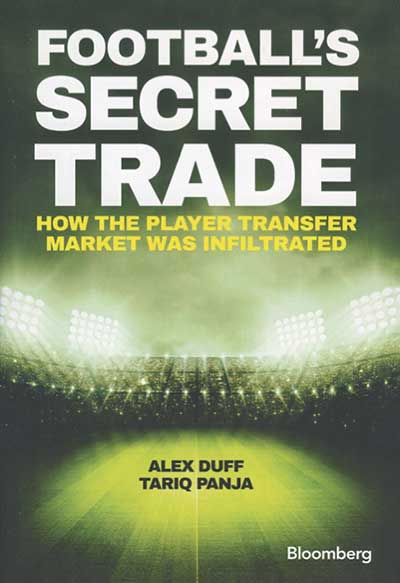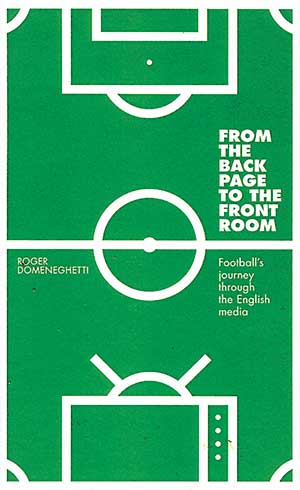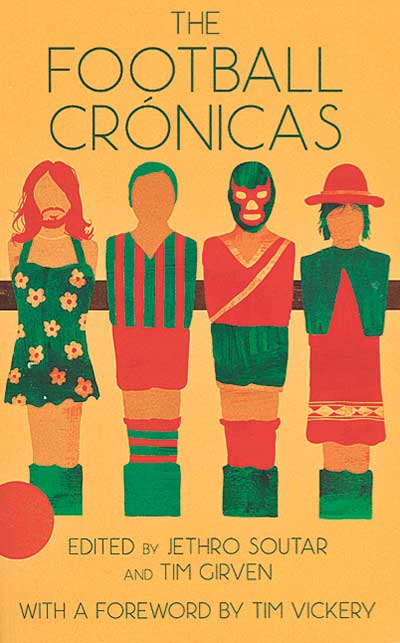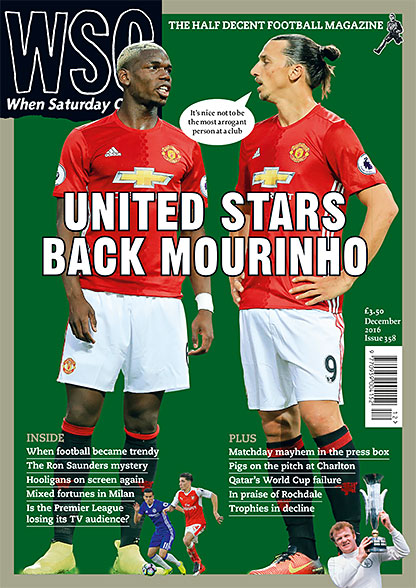Search: 'Football journalism'
Stories

by Alex Duff and Tariq Panja
Bloomberg, £20
Reviewed by Jonathan O’Brien
From WSC 364, June 2017
Buy the book
 Football’s journey through the English media
Football’s journey through the English media
by Roger Domeneghetti
Ockley Books, £12.99
Reviewed by Tom Davies
From WSC 339 May 2015
We are frequently told that both the media and football have become distortingly all-pervasive, so a history of the relationship between the two would appear long overdue. In this exhaustively well-researched book Roger Domeneghetti delves deeply not just into the earliest histories of both but into what initially seem like diversionary tangents – betting, gaming and comic strips. If these are occasionally longer than they need to be, they do at least fit the author’s wider, convincing narrative of mutual interdependence.
Tracing this many-tentacled history, from the newspaper boom in the late 19th century through to the Premier League, Sky and Twitter, it is obvious how football and the media industry have always fed off each other. We may rail against kick-off times being switched at the behest of TV companies but the “traditional” Saturday 3pm start is rooted in media demands. Regional newspapers in the late 1800s required standardised kick-off times to suit Saturday evening edition deadlines. Into the 20th century, early newsreels looked to play up talking points and personalities. Sport drove radio sales and provided events for the newly established BBC to build itself around.
A common theme is the authorities’ inability to prevent themselves being outwitted, or to protect the game’s wider interests. From the wrangling with the BBC that obstructed the broadcast of inter-war Cup finals to the way the FA allowed themselves to be outflanked by the TV companies and Premier League, wearily familiar shortcomings persist.
The BBC’s agreement to pay the FA £1,000 to broadcast the 1953 FA Cup final “set the template for football coverage to this day”, not least in investing the “Matthews final” with symbolism. Competition between broadcasters changed the game again: “If the football authorities were unclear as to how exactly their relationship with television should develop, neither the BBC nor their rivals had any such doubts,” writes Domeneghetti.
The chapter on the development of newspaper journalism sheds light on the changing status of players and their relationship with reporters, as well as on the way those papers have altered, with the expansion of broadsheet coverage flattening their distinction with the red tops; writers move between both with increasing frequency. Fanzines are also given their due for changing how football was written about in the mainstream.
Domeneghetti is a press box regular himself and writes about football for the Morning Star, so as might be expected a strong social-political context frames his narrative. This, and a breezy conversational style, ensures that the dominant perspective here is that of the ordinary fan/reader/viewer. Media-analyst business-speak is thankfully lacking.
Of course we end on blogs and social media, which have given both fans and players more of a voice while posing challenges to the traditional industry. “The process of becoming a football writer’s become more democratised,” Jonathan Wilson points out here, yet making a living from it becomes ever more precarious. The contention that football is central to new media might be overstated, but not by much, though the deaths of various sectors (radio, newspapers) have been predicted many times, and not always accurately. Instead, they’ve muddled through, much like clubs themselves.
 edited by Jethro Soutar
and Tim Girven
edited by Jethro Soutar
and Tim Girven
Ragpicker Press, £10
Reviewed by Nick Dorrington
From WSC 335 January 2015
The Crónica is a Latin American literary form, somewhat akin to the output of the new journalism movement of the 1960s and 1970s, in which the author involves themselves, to some degree, in the story. Written from a bold and engaging first-person viewpoint, it is a form that is the subject of a number of dedicated magazines across Latin America.
It is through the medium of the Crónica that this collection explores the football and society of a region in which a team bus is shown more deference than an ambulance in traffic, where villagers gather on a hillside to get the best possible signal for the radio broadcast of a match and where entire cities can be brought to a halt by an important fixture. These entries are supplemented by a book extract in similar style and three short stories.
The standard varies a little from piece to piece but the overall quality of both the writing and translation is to be applauded. Authors from across South America, plus two from Mexico, have been included, writing on subjects as varied as a prison team in Argentina, a Latino immigrant league in New York and a team of transvestites in Colombia. The rare missteps occur when the focus is on well-known subjects such as Alcides Ghiggia or Romário.
One of the most interesting entries is by the Peruvian writer Marco Avilés. It tells the story of the women’s football team of a high Andean village where no Spanish is spoken and the comforts of modern society are not to be found. The women travel down to the nearest developed city to take on the local team in a match that Avilés bills as a battle of ojotas (rustic flip-flops) versus trainers; ancient tradition against globalisation.
The changing face of football is masterfully described in a wry short story about an elderly man denied access to a stadium due to his failure to produce a shop loyalty card. “Purchasing power is all that matters,” a steward tells him as the man fruitlessly describes the various triumphs and defeats he has witnessed in his many years in the stands.
The best pieces in the collection are those about people who for one reason or another stand on the margins of mainstream society. We sometimes forget that football, in its most basic form, can act as a unifier for communities, or provide a platform for those whose voice is rarely heard. This theme is beautifully summarised in the final entry, a short story by Vinicius Jatobá that provides a fictionalised account of the genesis of Brazilian football and the emergence of Leônidas da Silva in the docks of Rio de Janeiro.
Laced with local patois and references to the art, food and history of the region, the book is, at times, a challenging, even daunting read. Explanatory footnotes would have been a welcome addition. Yet it is still an enlightening and ultimately rewarding excursion into the football and culture of Latin America.
